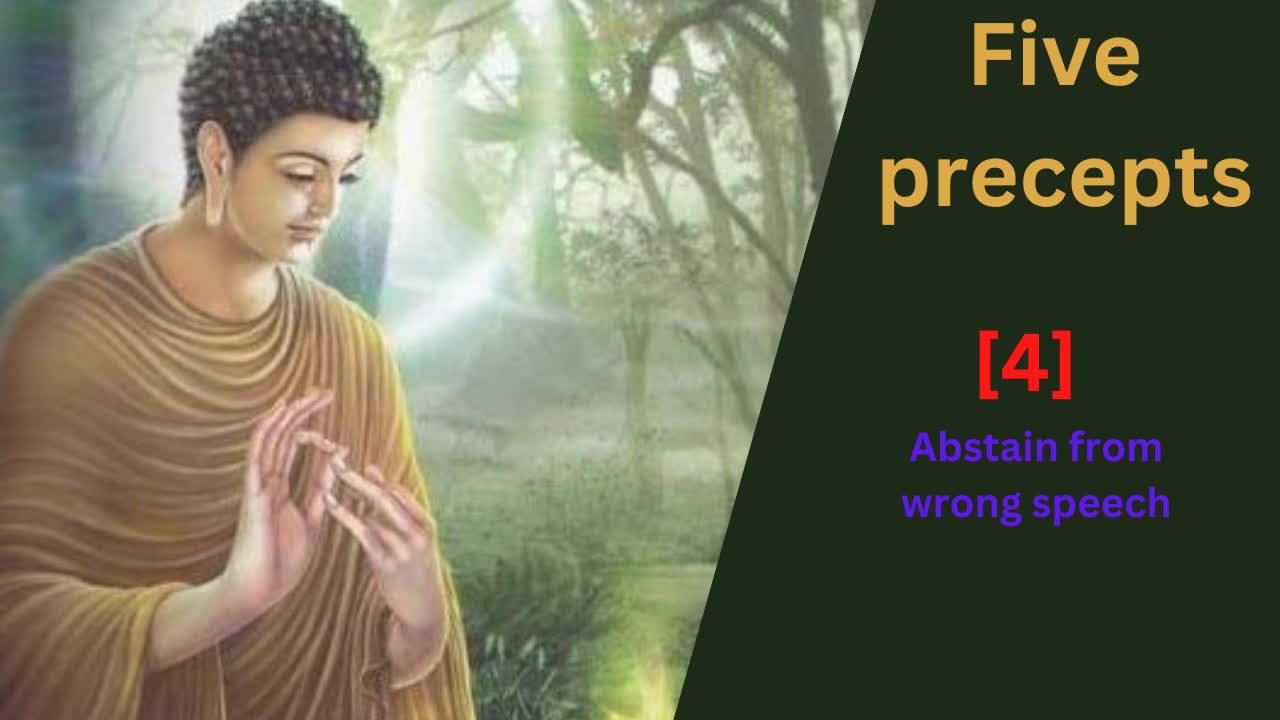Premium Only Content

Abstention from speaking lies (falsehood) | Budu Rajananvahanse | Universe True Story
my youtube channel
https://www.youtube.com/channel/UCX5gPI53s7A9oZ0yvfc-V5w
Fourth precept
4. Abstention from speaking lies (falsehood)
The fourth precept is to abstain from speaking in the wrong way. This is a very difficult thing in daily life. Abstaining from wrong speech means:
Not lying
Not speaking in a way that causes division among others
Not using rude language
Not gossiping
Actually, this rule means that you don’t chit-chat with your colleagues at the coffee machine, that you don’t gossip and don’t swear. Just look at most of the conversations you have and you will see how difficult this is. Causing no divisions means that you don’t say things that sow discord between people or groups. And then there is no lying, which also means lying for good or white lies.
The Buddha equates lying with standing still on the road and throwing away everything you have accomplished. Only someone who speaks the truth, he states, can see through the truth. In a piece of text about Right Speech as part of the Eightfold Path, quote a part of the sutta that deals with this, it is very worthwhile to read.
Although it is about abstaining from speaking the wrong way, every form of communication falls under it, even non-verbal or written communication. The mental aspect is abstaining from false and coarse thoughts, fooling yourself and the mental illusions about reality that occur to our untrained mind.
The active side of this precept is the development of honesty or truthfulness (sacca). Those who live in honesty and speak the truth focus on reality. If you adhere to this rule of life, you also bring harmony into your own life and into the lives of those around you, you gain a soft and friendly mind, and you are trustworthy.
It then becomes nice and inspiring to listen to you, and others never have to worry about what you say, whether they are there or not. In this way you contribute to peace and tranquility in the world.
5. Abstain from the use of intoxicating
The fourth precept involves falsehood spoken or committed to by action.Avoiding other forms of wrong speech are also considered part of this precept, consisting of malicious speech, harsh speech and gossip. A breach of the precept is considered more serious if the falsehood is motivated by an ulterior motive (rather than, for example, "a small white lie").
The accompanying virtue is being honest and dependable, and involves honesty in work, truthfulness to others, loyalty to superiors and gratitude to benefactors. In Buddhist texts, this precept is considered second in importance to the first precept, because a lying person is regarded to have no shame, and therefore capable of many wrongs. Untruthfulness is not only to be avoided because it harms others, but also because it goes against the Buddhist ideal of finding the truth.
In practice
The fourth precept includes avoidance of lying and harmful speech. Some modern teachers such as Thich Nhat Hanh interpret this to include avoiding spreading false news and uncertain information.Work that involves data manipulation, false advertising or online scams can also be regarded as violations. Terwiel reports that among Thai Buddhists, the fourth precept is also seen to be broken when people insinuate, exaggerate or speak abusively or deceitfully.
taruvan saranai
-
 1:46:28
1:46:28
vivafrei
5 hours agoKeir Starmer Goes Full Tyrant! Canada Goes Full Gestapo! Trump Picks & MORE! Viva Frei Live
48K11 -
 LIVE
LIVE
Akademiks
3 hours agoDiddy Last Stance! Bail Hearing Live! Lil Durk Case update! Young Thug not getting back his SH*T?
5,428 watching -
 LIVE
LIVE
ThatWhiteFish (Gaming)
1 hour ago $0.94 earnedNew to the Franchise! Can we survive? Do you have rations?
337 watching -
 LIVE
LIVE
The New American
1 hour agoIs The Deep State Trying to Trigger WW3 Before Trump Takes Office? | The New American Daily
600 watching -
 51:36
51:36
PMG
13 hours ago $1.81 earned"Hannah Faulkner and Sophia Lorey | FIRST AMENDMENT VIOLATED"
11K2 -
 LIVE
LIVE
Flexarot
2 hours agoGetting The Bansho Fan & Crane Level Capped! (Dragon Ball Online Galaxy)
197 watching -
 1:17:57
1:17:57
Russell Brand
3 hours agoLara Logan EXPOSES the Media's Hidden Agendas & Power Plays – SF499
109K153 -
 LIVE
LIVE
checkmate7_7
8 hours ago $2.71 earnedSlammin Apex clams | !GUILDED
248 watching -
 LIVE
LIVE
RonjnJeremy
4 hours ago $3.02 earnedClassic Wow 20th Anniversary edition HC PT 2 Seemless...Orc to troll...Still Shaman
338 watching -
 1:58:24
1:58:24
The Charlie Kirk Show
3 hours agoMatt Gaetz Speaks + Why Dems Lose the Bathroom Battle + Shut Down The Education Cartel | 11.22.24
108K47